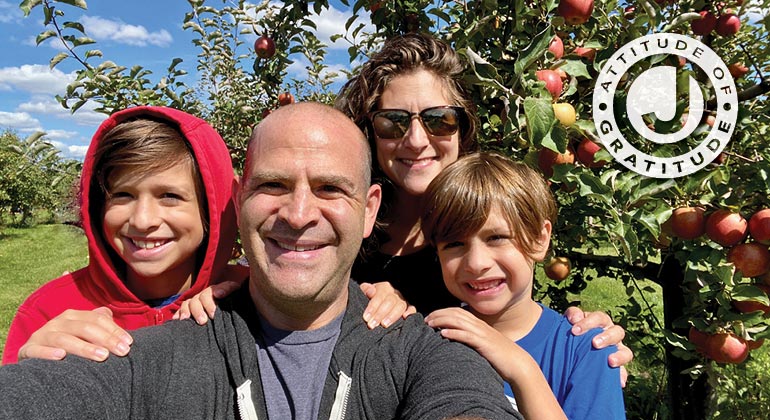The Value of Practicing Gratitude (Even When We Don’t Feel Like It)

In the early days and weeks of the pandemic, amidst the overwhelming uncertainty and disorientation of it all, it was relatively easy to find the silver linings of a stay-at-home order. Leisurely morning coffee in jammies, the safety and privilege of working from home, mid-day family walks around the block, permission to stop making social plans… In many ways it was a welcome respite from the usual hustle and bustle of our life as a two-career family with school-aged kids.
But now, eight-plus months into this crisis, the bloom is most definitely off that rose. As cases continue to spike, a second stay-at-home advisory has gone into effect this week in Illinois. Our leaders are asking us to hunker down yet again, cancel any travel plans that offered a dim beacon of light in this darkness, and forego those yearned-for holiday traditions that, by definition, call for gathering people together in joy and celebration. It’s no wonder that, like so many I’ve talked to, I’ve been feeling pretty low these days; resigned, depleted, exhausted, and frankly – numb. Thanksgiving is just a week away, but how can I begin to feel grateful when I’m just barely feeling human?
As it turns out, leading gratitude researcher Robert Emmons makes an important distinction between feeling grateful and being grateful. He acknowledges the fact that we don’t have total control over our emotions; We cannot easily will ourselves to feel grateful, less depressed, or happy. Rather, he asserts that being grateful is a choice. Psychological experiments show that feeling happy can make us smile, but also the act of smiling can make us feel happy. Likewise, there is a strong argument that acting in a grateful manner can generate more positive emotions within us, particularly during times of adversity.
How fitting, then, that the Hebrew term for gratitude is “hakarat hatov,” which literally means, “recognizing the good.” We are called to put gratitude into action by acknowledging the givers of gifts – whether it’s another person, an inanimate object, or some higher spiritual force. Indeed, traditional Judaism includes blessings for all the “miracles” we experience daily – such as waking up in the morning, sitting down to a meal, and the relationships we hold most sacred. In essence, in our Jewish tradition, every day is Thanksgiving!
This Thanksgiving and holiday season, we encourage you to begin creating a unique gratitude practice that resonates for you and your family. Following are some simple ideas to turn your gratitude from attitude to action:
- Model your appreciation of others’ time and effort by consistently saying “thank you,” andbe as specific as possible about what the person did or said that made a difference for you. This includes acknowledging your children for their contributions at home and school.
- Tell your children regularly what you are grateful for in your life, and what you appreciate in them as a son or daughter, brother or sister, or friend.
- Help your children recognize and appreciate the intangible gifts from others with comments such as, “it was so thoughtful of Sarah to call you to ask how you are feeling” or “how special that grandma spent time teaching you how to knit.”
- Encourage your children to write thank you notes, not only when they receive gifts but also to acknowledge others for their friendship or support.
- Develop a daily gratitude meditation or recite a prayer as a family before dinner or with your children at bedtime.
- Create a gratitude jar and have family members write down on a slip of paper something that they are grateful for each day (younger children can dictate to you what to write; older children can draw pictures and begin to write words). At the end of the week, take turns picking out slips and reading aloud what was written.
- Express yourselves with a gratitude-inspired art project that the family can do together. Ideas include photo and magazine collages, a family quilt, or homemade thank you cards (great to use for the upcoming holidays!).
- Use a website to set up a free and private online gratitude journal. There are lots to choose from!
Through our daily actions and conversations and the intentional rituals we create as a family, we can nurture the value of hakarat hatov in ourselves and in our children, bolstering resilience and fortitude in these difficult times. In this spirit, we wish you all a Happy Thanksgiving filled with quiet reflection, meaningful connection, and a burgeoning gratitude practice that may continue to nourish you, long beyond the festive meal.
Want to teach your child more about gratitude? Check out these book recommendations below.
Book Recommendations:
- Have You Filled a Bucket Today by Carol McCloud
- The Thankful Book by Todd Parr
- Rivka’s First Thanksgiving by Elsa Okon Rael
- The Keeping Quilt by Patricia Polacco
This blog was updated from Jen’s original blog published on November 25, 2019. View original blog.
Jen Streicher Bio
Jen Streicher, MS, LCSW has been a member of JCC Chicago’s Early Childhood Social Services Team for the past ten years. She holds dual bachelor’s degrees in Communication Studies and Spanish from the University of North Carolina – Chapel Hill and dual master’s degrees in Child Development and Social Work from Erikson Institute and Loyola University Chicago.
Jen lives in Chicago, where she is currently working remotely/managing e-learning/coordinating virtual play dates/stressing about all this screen time with her husband and two school-age boys.






